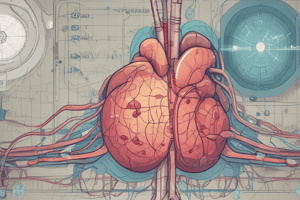Podcast
Questions and Answers
Renin plays a role in regulating blood pressure.
Renin plays a role in regulating blood pressure.
True (A)
Erythropoietin is involved in the production of white blood cells.
Erythropoietin is involved in the production of white blood cells.
False (B)
The kidney receives about 10% of the resting cardiac output.
The kidney receives about 10% of the resting cardiac output.
False (B)
Concentration of chemicals in the tubular fluid helps in diluting potential toxicants.
Concentration of chemicals in the tubular fluid helps in diluting potential toxicants.
The unique sensitivity of the mammalian kidney to toxic effects is attributed to its physiological features.
The unique sensitivity of the mammalian kidney to toxic effects is attributed to its physiological features.
The unique susceptibility of the mammalian kidney to noxious chemicals is not related to its physiologic features.
The unique susceptibility of the mammalian kidney to noxious chemicals is not related to its physiologic features.
High renal blood flow contributes to the fact that drugs or chemicals in the systemic circulation are not delivered to the kidneys in relatively high amounts.
High renal blood flow contributes to the fact that drugs or chemicals in the systemic circulation are not delivered to the kidneys in relatively high amounts.
Forming concentrated urine does not serve to concentrate potential toxicants in the tubular fluid.
Forming concentrated urine does not serve to concentrate potential toxicants in the tubular fluid.
Amphotericin-B is not associated with nephrotoxicity.
Amphotericin-B is not associated with nephrotoxicity.
Aminoglycosides do not have any impact on renal function.
Aminoglycosides do not have any impact on renal function.
The concentration of chemicals in the tubular fluid does not drive passive diffusion of toxicants into tubular cells.
The concentration of chemicals in the tubular fluid does not drive passive diffusion of toxicants into tubular cells.
Papillary necrosis is not associated with any kidney pathology.
Papillary necrosis is not associated with any kidney pathology.
Renal dysfunction is never linked to the administration of certain medications.
Renal dysfunction is never linked to the administration of certain medications.
Erythropoietin plays a role in the production of red blood cells.
Erythropoietin plays a role in the production of red blood cells.
The kidneys receive about 20% to 25% of the resting cardiac output.
The kidneys receive about 20% to 25% of the resting cardiac output.
Flashcards are hidden until you start studying
Study Notes
Hormone Synthesis
- Synthesis and release of hormones such as renin (role in BP regulation) and erythropoietin (role in the production of red blood cells)
- Metabolism of vitamin D3 to the active 1,25dihydroxy vitamin D3 form
Susceptibility of the Kidney
- Unusual susceptibility of the mammalian kidney to toxic effects of noxious chemicals due to:
- High renal blood flow (20-25% of resting cardiac output)
- Concentration of chemicals in tubular fluid
- Formation of concentrated urine concentrates potential toxicants in tubular fluid
- Reabsorption of water and electrolytes from glomerular filtrate concentrates chemicals, driving passive diffusion into tubular cells
Pathophysiologic Responses of the Kidney
- Acute renal failure (ARF): sudden reduction in GFR with resulting azotemia
- Clinical manifestations: minimal elevation in serum creatinine to anuric renal failure
- Chronic Kidney Disease: progressive deterioration of renal function with long-term exposure to chemicals (e.g., analgesics, lithium, cyclosporine)
Adaptation Following Toxic Insult
- Kidney's remarkable ability to compensate for loss in renal functional mass
- Following unilateral nephrectomy, GFR of remnant kidney increases by 40-60%
- Compensatory increases in single-nephron GFR accompanied by proportionate increases in proximal tubular water and solute reabsorption; glomerulotubular balance
Assessment of Renal Function
- Urine analysis:
- Urine volume and osmolality (increased urine volume with decreased osmolality: impaired concentrating ability via defect in ADH synthesis, release, and/or action)
- Urinary composition (Proteinuria or Glucosuria)
- Glucosuria: reflects defects in proximal tubular reabsorption of sugars
- Proteinuria: urinary excretion of protein (albumin: glomerular damage, β2-macroglobulin: proximal tubular injury)
- Glomerular filtration rate (GFR): quantified directly by determining creatinine or inulin clearance
- Indirect markers of GFR: blood urea nitrogen (BUN) and serum creatinine concentrations
Studying That Suits You
Use AI to generate personalized quizzes and flashcards to suit your learning preferences.




